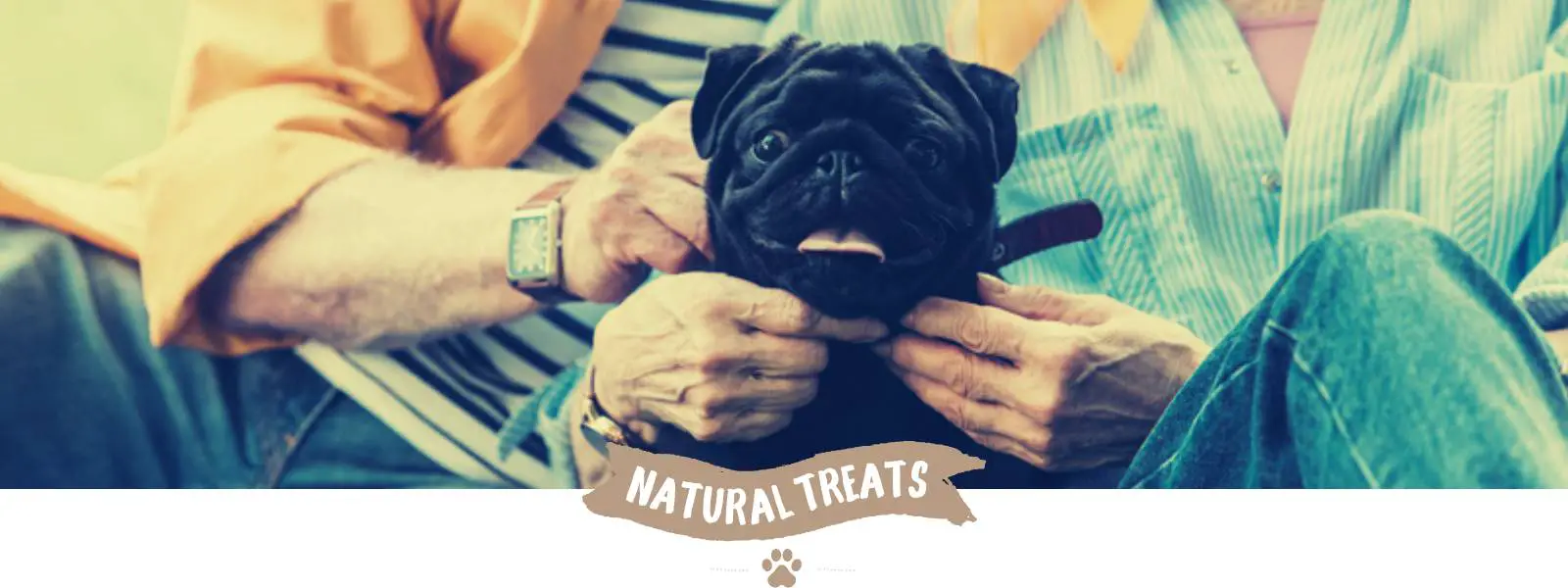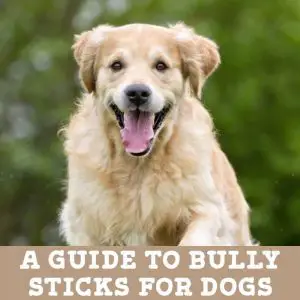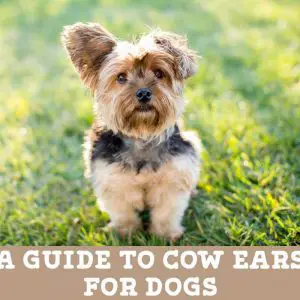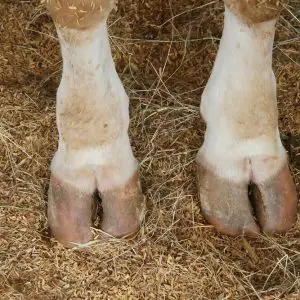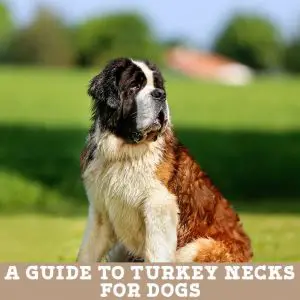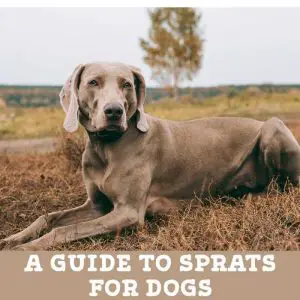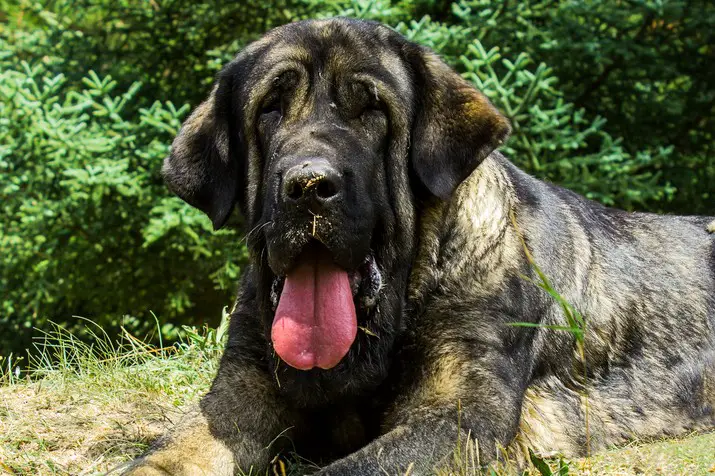
Paddywack for dogs…wait… Paddywhat?! That might be a contender for the weirdest name for a dog chew ever. But what exactly are they? Are they tasty? Are they safe? Do dogs like them? We’ve looked into it all, so you don’t have to!
Key facts
Paddywacks are made from the ligaments of sheep or cows.
Ligament is quite difficult to digest, so their nutritional value is low, but they are often low in fat and may be lower in calories than other chews.
Paddywacks may help to reduce plaque or tartar, but there is a risk of fracturing teeth if they are too hard.
Larger pieces of Paddywack can cause choking or a blockage in the intestines, so dogs should always be supervised when chewing.
Paddywacks are not suitable for puppies less than six months old.
What is a Paddywack?
Paddywack is the common name for the nuchal ligament of cattle and sheep. The nuchal ligament is a thick, elastic band of tissue that connects the back of the head to the neck. This ligament may be separated, dried out, and then fed as a dog chew.
Provenance
The nuchal ligament is not usually eaten by humans, and might otherwise go to waste if not used in these chews. It can be made from almost any type of cow or sheep, so you should check with individual manufacturers to see where they get their raw ingredients from. Some may use organic ingredients, or those from high-welfare herds, but this is not always the case.
Preparation
Paddywack is made by cutting the ligament into portions, and then air-drying it in an oven to remove the moisture. Some manufacturers may also powder the outside – if so, you should be able to see this explained on the packet.
Benefits of Paddywack for Dogs
Key benefits
Dental Health
May help to reduce tartar and plaque
Long Chew Time
Paddywacks often make tough chews that even big dogs may take a while to get through!
Low Fat
Many versions are high in protein and low in fat
Dental Health
Their toughness and ridged texture means that chewing a Paddywack will have an abrasive action on dogs’ teeth, and this may help to reduce the levels of tartar and plaque that accumulate on their teeth. It may also make their breath smell a little fresher!
However, dental chews are not effective against moderate or severe tartar, so you should see your veterinarian if your dog has any existing issues.
Long Chew Time
The nuchal ligament is strong and fibrous, so Paddywacks make a solid chew that can take dogs a while to get through! Depending on how they are made, beef scalps may make a very dense chew that can keep a large adult dog occupied for some time!
Nutritional Information for Paddywacks
The precise makeup of a Paddywack chew will vary depending on the exact process that the manufacturer uses to make it.
Nutrition
Protein
These chews are usually 100 percent beef or lamb ligaments, meaning they only contain one kind of protein.
Ligaments are one of the “gristly” bits of meat, and although they do have a high protein content, this protein may be quite difficult for dogs to digest. This may mean that dogs with mild or moderate food allergies to other proteins (like chicken, fish, or wheat) may be able to enjoy these treats.
However, dogs who have serious allergies could still react to contamination from trace amounts of other proteins that are being used in the same kitchen. If your dog has known food allergies, speak to your veterinarian before feeding Paddywacks.
Fat
Some Paddywacks have a low fat content, but others may be up to 10 percent fat, so it is worth paying attention to the label when choosing your chew. Higher-fat treats may lead to stomach upsets in sensitive dogs (vomiting, diarrhea, or both), particularly if they are not used to eating these kinds of chews.
More rarely, they could lead to pancreatitis (an inflamed pancreas). This causes vomiting and diarrhea but is also very painful and is potentially life-threatening.
Vitamins, Minerals, and Compounds
Ligaments (which Paddywack is made from) have a relatively low nutritional value, which is why they are not often eaten by humans. Their tough structure means that dogs will find it difficult to digest them and extract any beneficial vitamins or minerals. However, if your dog is already being fed a balanced diet, then they do not need anything extra.
(Probably) On the Low Side
We do not know the exact calorie content of Paddywack – it is likely to vary depending on exactly how it is made. However, given that ligament is hard to digest, if you pick a low-fat version then the calorie count will probably be fairly low.
Feeding Guide
Paddywack chews come in all shapes and sizes, so you need to choose carefully to make sure that they are right for your dog. Pieces that are too large may be difficult for your dog to chew, but pieces that are too small may be a choking hazard, especially if swallowed quickly!
To ensure your dog gets a balanced diet, you must make sure that treats, chews, and other tidbits (including human food!) make up no more than ten percent of your dog’s daily food, by weight. If you feed them more than this, then you risk their diet becoming unbalanced.
Downsides and Risks of Paddywacks for Dogs
Some Moderate Risks
Hard pieces of Paddywack may be difficult to chew, and could damage dogs’ teeth. If your dog tries to swallow a large piece, there is a risk of choking, or a blockage in the bowel.
Damaged Teeth
Harder pieces of Paddywack can fracture dogs’ teeth if they bite down on them too hard. Tooth fractures are very painful, but also very hard for us as pet parents to spot. Regular examination by a veterinarian will help to detect any problems.
You can test whether a chew is too hard by pressing into it with your thumbnail. You should be able to make a dent in the chew – if you cannot, then it may be able to damage your dog’s teeth. In this case, soaking the chew in warm water can soften it and make it safer.
Choking
Larger pieces of Paddywack can get stuck if your dog tries to swallow them too soon. This is particularly likely to happen if they are over-excited, or if they are feeling threatened and need to protect their chew. If pieces of Paddywack get stuck at the back of the throat, this can block the windpipe and cause the dog to choke. If this happens, call a vet immediately.
Dogs should always be supervised when chewing treats like Paddywack.
Bowel Obstruction
Your dog may be able to swallow medium-sized pieces of Paddywack, but these can still cause problems. The ligaments that Paddywack is made from are difficult to digest, so these pieces may become stuck in the stomach or the intestines and cause a blockage. This is potentially life-threatening and needs urgent treatment by a veterinarian.
You should supervise your dog while they are chewing Paddywack to try and prevent this. If your dog seems to be in pain or starts to vomit after eating Paddywack, call your veterinarian immediately.
Paddywacks for Puppies
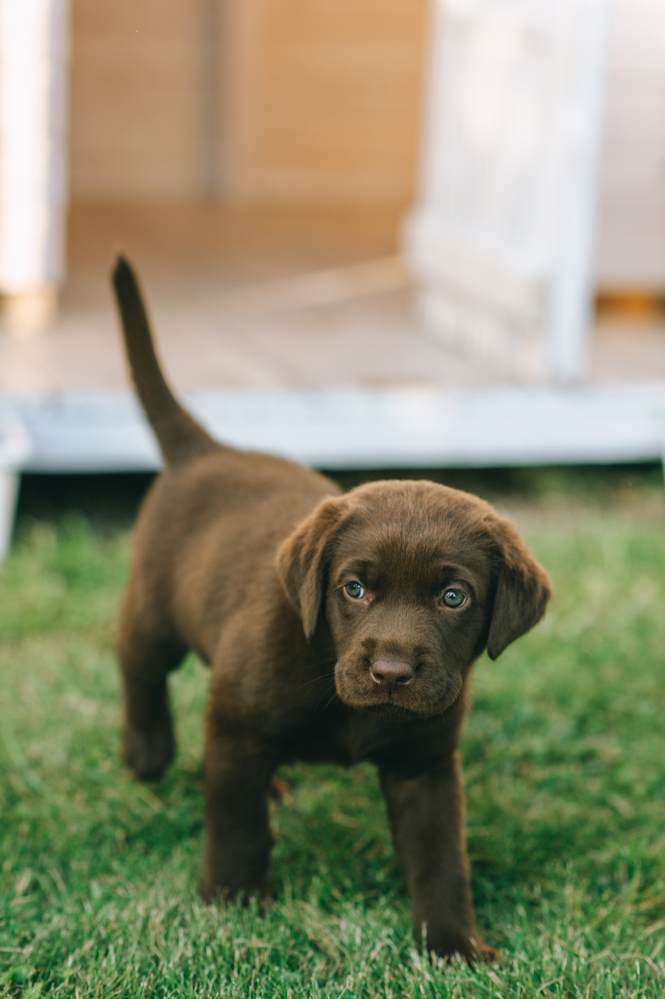
Paddywacks are fairly hard chews even for adult dogs, and are not suitable for young puppies. Chewing on hard chews at a young age risks damaging a puppy’s “baby teeth,” and potentially their adult teeth, too.
Puppies do not usually have all their adult teeth until they are six or seven months old. A veterinarian or veterinary technician can examine your puppy to see if their adult teeth have finished erupting.
Just as with adult dogs, chews and treats should not make up more than ten percent of a puppy’s diet. Otherwise, they may miss out on getting vital nutrients from their regular food.
Alternatives to Paddywacks
- Tendons – These tend to be another type of long-lasting chew that are high in protein and low in fat. Read about beef tendons here and ostrich tendons here.
- Vet-Approved Dental Chews – If you are on the lookout for dental-friendly chews, the Veterinary Oral Health Council (an independent organization) keeps a list of approved chews and diets that can help you with this.
- Tooth Brushing – The best way to keep your dog’s teeth clean is to brush them, just like you would your own! Doggy toothbrushes can be found in most pet stores, and the Veterinary Oral Health Council also lists recommended toothpastes.
- Crunchy Vegetables – If your dog loves to chew but is also prone to putting on weight, then a bit of veg may be the perfect option for them! Go for carrots or celery if they like a bit of a crunch, or else cooked broccoli or cauliflower can give them a good chew – particularly if you include the stalks! They are also high-fiber and low-calorie, which can help your dog to lose weight.
FAQs
Paddywacks may be relatively low-fat dog chews, but they do not have a high nutritional value. They may help to keep teeth clean, though!
Many dogs will eat Paddywacks without any problems, but there is always some risk when feeding these kinds of harder chews. Potential problems include damage to the teeth, choking, or a blockage in the gut. Always supervise your dog when they have a Paddywack.
Paddywacks have a meaty smell and flavour, so many dogs will enjoy them! However, there will always be some dogs who do not.
Paddywacks are treats, and treats should make up less than ten percent of a dog’s daily food intake. Chews like Paddywacks should only be fed once or twice a week.
That will depend on how keen your dog is to chew! A determined dog may get through a small one in about ten minutes, but larger ones may last half an hour or more.
Unfortunately, yes. Larger pieces of Paddywack are difficult for dogs’ bodies to digest, and may become stuck in the stomach or intestines. Dogs chewing Paddywacks should always be supervised to prevent them from swallowing pieces that are too big.
Paddywack have a meaty smell, though how strong this is will vary between brands. They may also become soggy if your dog leaves them for a while. However, many dogs will eat a Paddywack relatively quickly!
Yes. Like any kind of chew, Paddywacks may give dogs a stomach upset (vomiting, diarhhoea, or both). This is especially likely if your dog does not often eat Paddywacks. Dogs who are known to be allergic to beef or lamb should not be fed Paddywacks.
Paddywack is made from the nuchal ligament – a strong piece of tissue that connects the back of the head to the neck. This is removed as part of the butchering process after the cow or sheep has been slaughtered, and then air-dried.

